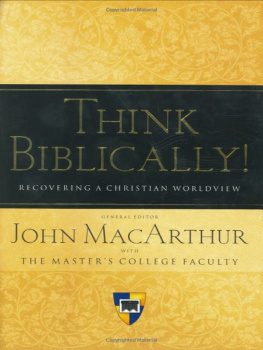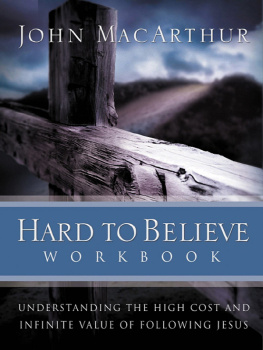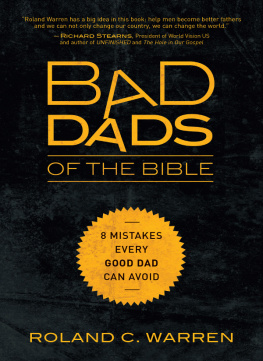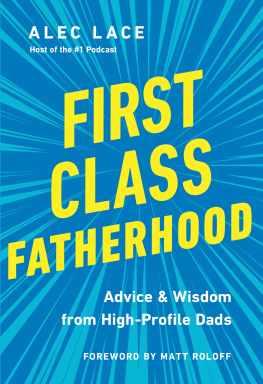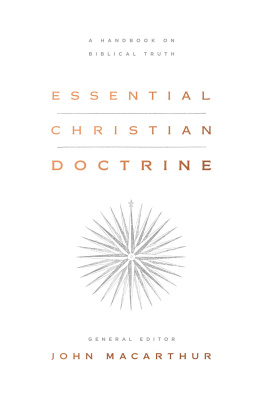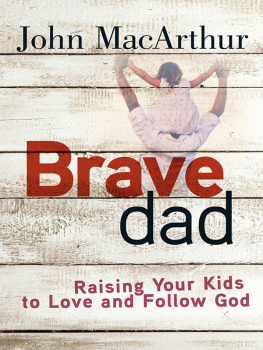

HARVEST HOUSE PUBLISHERS
EUGENE, OREGON
Unless otherwise indicated, all Scripture verses are taken from the New American Standard Bible, 1960, 1962, 1963, 1968, 1971, 1972, 1973, 1975, 1977, 1995 by The Lockman Foundation. Used by permission. (www.Lockman.org)
Scripture quotations marked NIV are taken from the Holy Bible, New International Version, NIV. Copyright 1973, 1978, 1984, 2011 by Biblica, Inc. Used by permission. All rights reserved worldwide.
Verses marked KJV are taken from the King James Version of the Bible.
Verses marked NKJV are taken from the New King James Version. Copyright 1982 by Thomas Nelson, Inc. Used by permission. All rights reserved.
Cover by Koechel Peterson & Associates, Inc., Minneapolis, Minnesota
Cover photo maigi / Shutterstock
BEING A DAD WHO LEADS
Copyright 2014 by John MacArthur
Published by Harvest House Publishers
Eugene, Oregon 97402
www.harvesthousepublishers.com
Library of Congress Cataloging-in-Publication Data
MacArthur, John, 1939-
Being a dad who leads / John MacArthur.
pages cm
Includes bibliographical references.
ISBN 978-0-7369-5931-5 (hardcover)
ISBN 978-0-7369-5932-2 (eBook)
1. FathersReligious life. 2. FatherhoodReligious aspectsChristianity. 3. LeadershipReligious aspectsChristianity. I. Title.
BV4529.17.M25 2014
248.8'421dc23
2013034395
All rights reserved. No part of this electronic publication may be reproduced, stored in a retrieval system, distributed, or transmitted in any form or by any meanselectronic, mechanical, digital, photocopy, recording, or any otherwithout the prior written permission of the publisher. The authorized purchaser has been granted a nontransferable, nonexclusive, and noncommercial right to access and view this electronic publication, and purchaser agrees to do so only in accordance with the terms of use under which it was purchased or transmitted. Participation in or encouragement of piracy of copyrighted materials in violation of authors and publishers rights is strictly prohibited.
To my children: Matt, Marcy, Mark, and Melinda.
All of them are walking with Christ, raising their own children in the discipline and instruction of the Lord.
That is far and away the greatest joy a father can experience.
Contents
N o duty in my life is more important or more sacred than my role as a husband and father. That is where my true character is most accurately seen, and it is the best single gauge of my overall success or failure as a leader and role model. Everything else I do as a pastor, educator, author, or ministry leader would be severely compromised if I failed to lead my own family properly. In fact, this is one of the key tests of whether any man is fit to lead the church, because if a man does not know how to manage his own household, how will he take care of the church of God? (1 Timothy 3:5). Conversely, if a man cultivates grace, godliness, and the mind of Christ in his home life, the fruit of the Spirit will naturally be seen in abundance throughout every facet of his lifehis performance in the workplace, all his relationships, and his conduct in the world.
Furthermore, because home is where a persons true temperament is most clearly on display, no one knows the real character of a man better than his own children. They see with a keener clarity than most dads realize. If a mans public persona is merely a hypocritical veneer that disappears in the privacy of the home, the kids will be the first to see that. Indeed, its hard to imagine anything more destructive to a childs moral and spiritual development. An ungodly, hypocritical, or indifferent dad is not only a constant, full-time negative role model; his influence also breeds cynicism, unbelief, discouragement, resentment, and a whole new generation of hypocrisy in his own children. Thus the iniquity of the fathers [is visited] on the children to the third and the fourth generations (Numbers 14:18; cf. Exodus 20:5; 34:7).
On the positive side, however, no one can have a more potent or longer-lasting influence for good in a childs life than a spiritually strong father. Bringing our children up in the discipline and instruction of the Lord (Ephesians 6:4) is not only a duty; it is also a great privilege, for a wise son makes a father glad (Proverbs 10:1; 15:20). There is no greater joy in life than to see ones own children walking in the truth (cf. 3 John 4). In other words, nothing is a more worthy investment of any fathers time and energy than this: Be a godly leader in your own home. The returns you will reap include eternal riches of inestimable value, and the earthly rewards alone are sweeter and more valuable than any amount of material wealth.
This book, I trust, will be a help and encouragement to you as you pursue that goal. I have purposely kept it brief, simple, and focused. That is, after all, in keeping with the biblical instructions for fathers. Fatherhood is, of course, a prominent theme from Genesis to Revelation, and principles of parenting are scattered throughout. But glean and organize all of them together and what you will discover is that the Bibles guidelines for fathers are few and simple. Unlike many of todays parenting manuals, Scripture doesnt treat parenting as an arcane or bewildering conundrum. The fathers duties are straightforward and fairly basic. What makes fatherhood seem difficult are our own inconsistencies and weaknesses. Thats because parenting is first and foremost a spiritual taskone in which personal righteousness, self-control, and the mortification of our own flesh are all necessary prerequisites to proper discipline and instruction of our children. In short, the only way to be a dad who leads well is to be a dad who lives well.
May God bless you and empower you in your pursuit of that goal.
R ICH G REGORY
B y Gods design and Gods will, the husband is the head of the household; he is the leader of the family. Scripture makes it clear he is the one responsible for the success of the marriage and family, and the well-being of everyone involved. This headship is affirmed from the beginning of time at creation, a fact explained by the apostle Paul in 1 Corinthians 11, where he states, The man is the head of a womanFor man does not originate from woman, but woman from man; for indeed man was not created for the womans sake, but woman for the mans sake (verses 3,8-9). In that passage, Paul upholds the concept of a mans headship in the family by appealing to the order of creationman was created first, then womanand the fact woman was created to help the man (Genesis 2:18,21-24).
Later, in the most significant passage on marriage and family relationships in the entire New Testament, Paul once again addresses the married mans role as head of his own home. In the course of writing about the relationships between husbands, wives, and children in Ephesians 5:226:4, Paul establishes that Gods design is that the husband is the head of the wife, as Christ also is the head of the church (verse 23). He then goes on to provide specific instruction on how husbands are to fulfill their leadership role, beginning with this important command: Husbands, love your wives, just as Christ also loved the church (verse 25).
This, then, is the husbands supreme responsibilityloving his wife. Using Christs love for the church as his example, Paul explains in the subsequent verses how the husbands love is to be manifest. Every man is to love his wife with a sacrificial, purifying, caring, unbreakable, Christlike loveall of which we will explore as we continue through this chapter.
Next page


